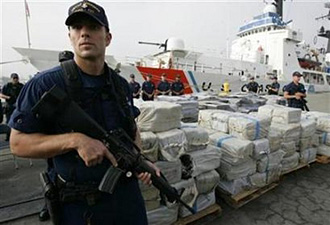 |
 |
 |
 News Around the Republic of Mexico | October 2007 News Around the Republic of Mexico | October 2007  
Mexico, US Claim Major Victory in Drug War
 Lizbeth Diaz - Reuters Lizbeth Diaz - Reuters
go to original


| | United States Coast Guards stand by 11.5 tons of cocaine in Alameda, California, 2005. Mexico and the United States are claiming a major breakthrough in the drugs war, citing record lows in U.S. cocaine supplies, a drop in gangland murders and the capture of several powerful traffickers. (Kimberly White/Reuters) |
Tijuana, Mexico - Mexico and the United States are claiming an important breakthrough in the drugs war, citing record lows in U.S. cocaine supplies, fewer gangland murders and the capture of several powerful traffickers.

The average price of a gram of cocaine on U.S. streets rose 24 percent between January and June to $118.70, its highest level in at least five years, because of tight supplies, U.S. anti-drug officials say.

Cocaine purity fell 11 percent in the same period, indicating that less is entering the United States.

"This impact is historic, this is real progress," said Rafael Lemaitre, a spokesman for the White House Office of National Drug Control Policy.

John Walters, the White House "drug czar," will officially announce the figures on Tuesday in San Diego.

Some U.S. and Mexican law enforcement agents now predict a long-term decline in cocaine trade across their border, in contrast to a booming market for the drug in Europe.

But similar claims in the past have proven short-lived as Colombian and Mexican drug lords found new routes for South American cocaine into the United States.

Still, an army crackdown on drug gangs by President Felipe Calderon does seem to be hurting Mexican smugglers who ship most of the cocaine northward.

Since taking office last December, Calderon has sent some 25,000 troops to bring order to areas where the gangs are strong like the western state of Michoacan.

The military operations are causing control of the cartels to crumble, which in turn has broken down the narcotics delivery chain into the United States, said Victor Manuel Zatarain, a senior police intelligence chief in Tijuana.

The city, 20 miles from San Diego, is home to a cartel that runs drugs up the Pacific coast and over the land border into California.

Under Calderon's crackdown, executions between Mexican rival gangs have dropped from a peak in March when dozens of bodies were found every day.

Still, about 2,000 people have died so far this year in turf wars mainly between the Gulf Cartel and an alliance of traffickers from Sinaloa state.

Police in the northern state of Nuevo Leon were digging on Monday at a suspected mass grave sites where around 15 people killed in drug violence might be buried.

EXTRADITIONS

Mexico has extradited some of the country's most prominent traffickers to the United States this year, including Osiel Cardenas, head of the notorious Gulf Cartel based just south of Texas. Last week, Mexican police caught Sandra Avila, an important smuggler known as the "Queen of the Pacific."

A source close to the Gulf Cartel said the gangs are only lying low, avoiding the kind of high-level murders that provoked the army crackdown.

"The Gulf Cartel took a decision to stop the violence. It was attracting too much attention and getting in the way of business," the source said in the border city of Matamoros.

The United States is helping Mexican efforts with better coastal surveillance, causing a sharp rise in cocaine seizures along the Pacific and in Florida this year.

Mexico is also allowing Colombian anti-drug agents to infiltrate drug gangs in its country, Colombia's Attorney General Mario Iguaran said on Monday.

"With undercover agents ... when a plane or boat leaves Colombia, Mexican authorities are already alerted," he told an anti-drug meeting in Mexico City.

But some officials and drug trade experts warn that the Mexican cartels are regrouping.

"As cartel leaders are captured, other high-ranking members of the organization step up and take their place. The cartels, particularly the Gulf Cartel, remain strong. The story is not over yet," said Michael Sanders, a Washington-based special agent at the U.S. Drug Enforcement Administration.

A military crackdown launched in Tijuana in January has fizzled out due to a lack of intelligence, local police say.

Additional reporting by Robin Emmott in Monterrey and Miguel Angel Gutierrez in Mexico City. | 
 | |
 |



